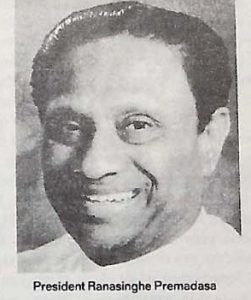
BANGALORE: Continuing his stance that India would not accede to the Sri Lankan request for the withdrawal of its army from the island nation, Indian Prime Minister Rajiv Gandhi linked Indian troop withdrawal with the grant of autonomy to Tamil areas of northern Lanka.
Speaking to reporters here on June 16 Gandhi categorically rejected the Sri Lankan president Ranasinghe Premedasa’s request that India withdraw its 45,000 troops by July 29, exactly two years after they had been admitted by his predecessor President Junius Jayewardhene.
Gandhi’s linking of the withdrawal with the granting of more autonomy to the Sri Lankan Tamil provinces meant in effect that he and not the Sri Lankan government would decide when the Indian troops would be withdrawn. The Sri Lankan president had announced on June 1 that he wanted the Indian troops to be withdrawn. He is evidently keen that the summit conference of the South Asian Nations (SAARC) be held without the presence of any foreign troops in the nation. The: summit is scheduled in November 1989 (WSN June 9).
Evidently emboldened with his talks with the militant Tamil Tigers or LTTE the Sri Lankan president decided to make a public announcement asking for the withdrawal of the Indian forces from the island nation.
Even though the Tamil Tigers were trained and equipped by the Indian army they fell out with it because they refused to accept the hegemony of India. The Tamil Tigers and the Indian Peace Keeping Force as the Indian troops are officially called have since been fighting each other. Over a thousand Indian soldiers have been killed in Sri Lanka for the last two years.
Sri Lanka authorities are now preparing for a second round of talks with the Tamil Tigers who regard the Indian army as their ‘primary target now and have inflicted a number of causalities in the recent weeks.
Gandhi said in Bangalore that India saw itself as the protector of Sri Lanka’s unity and integrity.” India was a joint guarantor of the Indo Sri Lanka agreement and until it is fully completed we are fully responsible for, primarily for the security of the Tamils in Sri Lanka but also of the unity and integrity of that island,” he said.
Foreign diplomats expressed their surprise at the prime minister of a country like India could declare himself as the protector of the unity and integrity of another sovereign nation. “It is preposterous,” one said. “It smacks of hegemony and big brotherness,” said another.
Indian role in the subcontinent has increasingly been perceived as that of a bully with Nepal and Sri Lanka as its principal recent victims. The refusal to withdraw its soldiers from Sri Lanka and its cutting off the overland trade roots of Nepal will be hard to reconcile with the peace loving image that country has carefully cultivated and nurtured.
Indian diplomats, citizens and businessmen are being guarded by Sri Lankan troops in Colombo and other places following tension in the area because the Indian army is perceived as an army of occupation by the native Buddhist Singhalese population as well as, increasingly, by the Sri Lankan Tamils.
Article extracted from this publication >> June 23, 1989